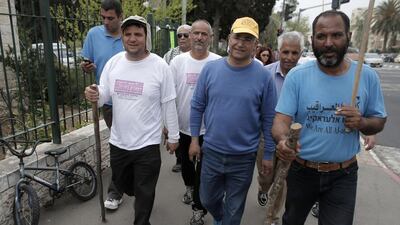ABU GHOSH, ISRAEL // Ahmad Tibi, a 56-year old member of Israel’s parliament is the first to concede he is not a long-distance athlete.
But he put on his track shoes to join an unprecedented four-day march to highlight the plight of 46 Bedouin Arab villages in Israel’s southern Negev desert that have not been recognised by the Israeli state. As a result the neglected villages lack electricity, water, easy access to schools and, it seems, a future.
Starting in the unrecognised village of Wadi Naam, 12km south of Beersheba on Thursday, the marchers –– whose numbers varied at different times between dozens and hundreds –– covered about 40km each day before ending the march outside the Israeli president’s residence in Jerusalem on Sunday.
“I joined this afternoon,” said Mr Tibi after the marchers arrived to a boisterous welcome in Abu Ghosh, just 10km west of Jerusalem, at nightfall on Saturday.
“It’s not something I’m accustomed to. At my age it isn’t easy. But I love the togetherness and I believe in what we are marching for. I cannot be silent. We are screaming ‘enough’. How can it be that in 2015 in a country that claims it is a democracy people have no infrastructure and no water?”
Israeli authorities say it is not feasible from a budgetary viewpoint to provide water and services for all the unrecognised communities. Authorities are reluctant to do so because this would undermine what they see as the state’s ownership of land on which these villages are situated.
But the residents of the villages — some of which predate Israel’s establishment in 1948 — view this policy as racism.
The Joint List, the alliance of four Arab political groupings that came together for Israel’s parliamentary elections held two weeks ago, made the plight of the villages a campaign issue.
Its leader, Ayman Odeh said the march was a way of raising public awareness to accompany the list’s submission of a plan to Israeli president Reuven Rivlin for recognition of all 46 communities.
Mr Odeh was due to hand Mr Rivlin the list on Sunday, but the president had to be in Singapore for the state funeral of the island nation’s founding father Lee Kuan Yew.
The two have agreed to meet upon Mr Rivlin’s return.
The plan would allow all the villages to remain in place and develop as viable communities.
"My idea is that before the new government even makes its guidelines, it should know that there are people here struggling for water, electricity and the basic right to live in a normal way," Mr Odeh told The National.
By marching, he said, “we are taking a civilian, democratic approach that is good for all the citizens of the state, Jews and Arabs”.
Mr Odeh, who was at the front of the march, wore a white T-shirt with a logo in Hebrew, Arabic and English saying “marching for recognition”.
He and other marchers were greeted by several hundred people upon arrival at Abu Ghosh..
After speeches inside a large welcoming tent, the marchers broke for a dinner as a light rain began to fall.
A colleague of Mr Odeh, Dov Khenin, a Jewish member of the parliament, or Knesset, for the Joint List also marched.
He said the event’s conception was heavily influenced by the inclusive tactics of Martin Luther King during the civil rights struggle in the US during the 1960s.
“It’s non-violent, and it’s in an optimistic atmosphere of reaching out,” he said. “It’s not a message of anger but one of hope.”
But for another marcher, Atiyeh Al Asam, the head of the regional council for unrecognised villages in the Negev, there was anger and frustration coupled with a desire to get the message across.
He described a dire situation in his own village of Abu Tlul, 10km from Beersheba.
“Conditions are very terrible, it is dark at night, there is no electricity, no established access roads into the community, no services, no running water in an established way. There is no employment.”
He said the state demolishes houses there and in other unrecognised communities on the grounds they are illegal structures and harms agriculture, and that authorities are routinely trying to force residents to give up their land and move to planned communities, where conditions could be even worse.
Aviel Liad, a spokesman for Israeli officials who deal with Bedouin policy, said authorities cannot just recognise these villages because in some instances the Bedouin have settled on government land and “the government wants sovereignty on this land”.
“We try to do things through agreement and cooperation but it is hard because there is a lot of suspicion and distrust,” he said.
According to Mr Liad, the government is trying to improve socio-economic conditions and is building infrastructure including new neighbourhoods, streets and sidewalks within Bedouin cities that are recognised by the state.
foreign.desk@thenational.ae

